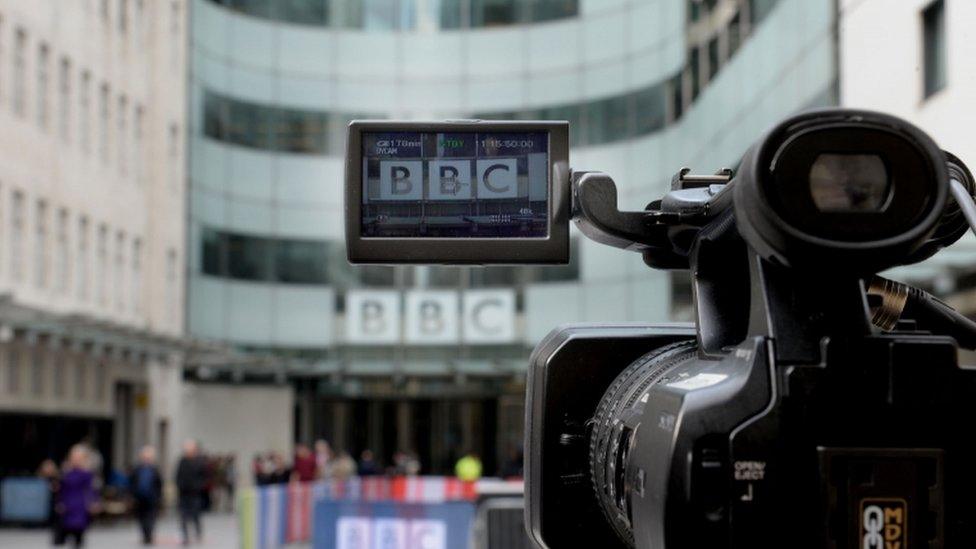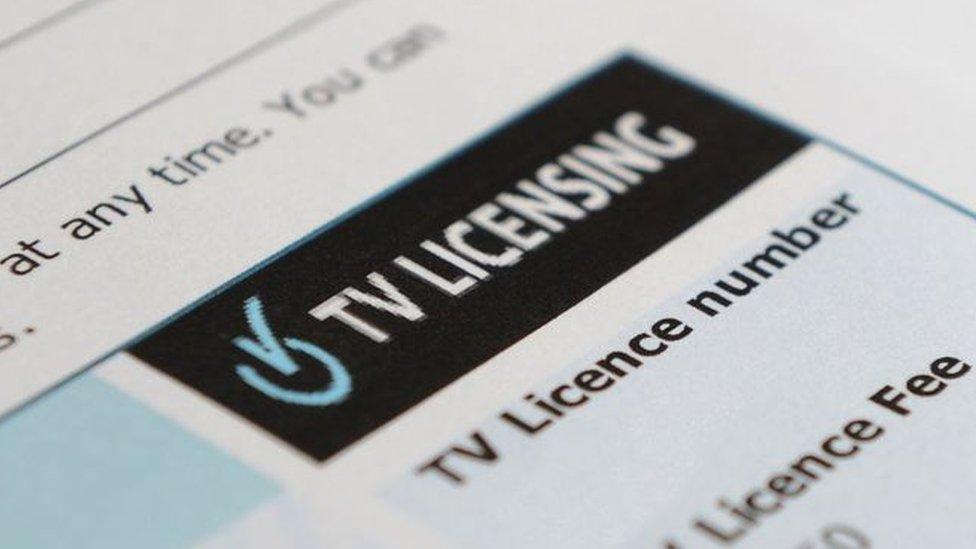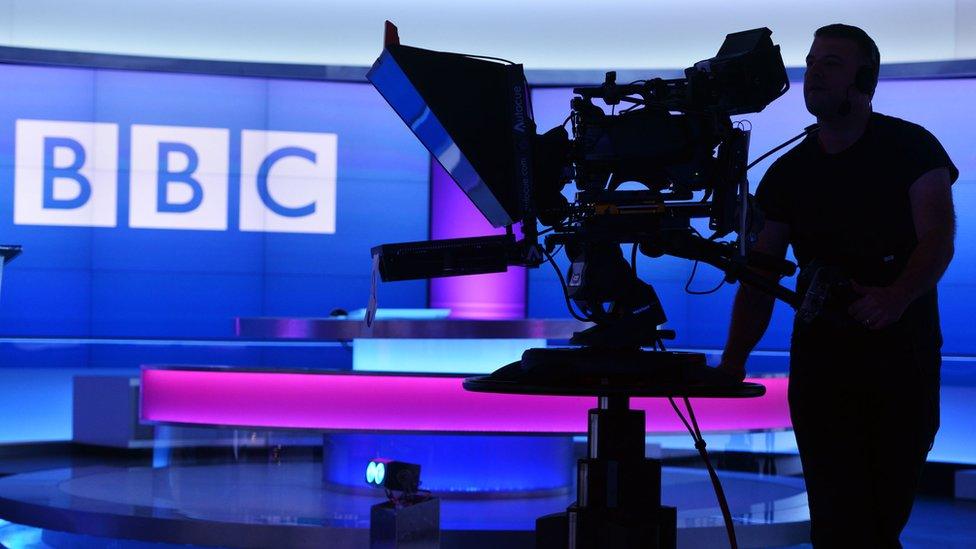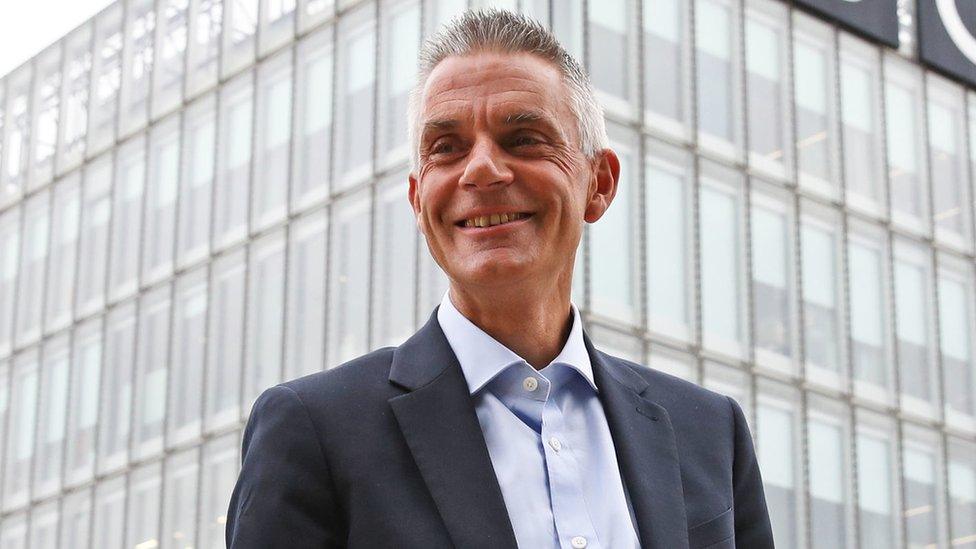Government will be 'forced to rely' on BBC licence fee model, MPs suggest
- Published
- comments

The government will be forced to rely on the current BBC TV licence fee model until 2038, a group of MPs has said.
A report from a Commons select committee suggests the failure to find a viable alternative form of funding meant the licence fee must remain for the term of the next charter.
A government spokeswoman said the licence fee would be reviewed before the current charter ends in 2027.
The BBC said it "welcomed this thorough and detailed report".
The corporation added: "We welcome the conclusion that the licence fee is the best way of funding a universal BBC."
The BBC announced last month that the annual licence fee will increase from £157.50 to £159 from April 2021. It came after three million over-75s lost their free TV licence entitlement.
'Limited shelf life'
The report, which was published by the Department for Digital, Culture, Media and Sport select committee on Thursday, focused on the future of public service broadcasting.
It concluded that the government's failure to put in place the necessary broadband infrastructure, which would allow for other funding mechanisms, meant it had no option but to stick with the licence fee for the next 10-year charter period.
Currently, a move to a digital system would result in 1.8 million households losing access to public service broadcasting because of a lack of broadband access and digital skills, the report said.
"It's clear that the BBC TV licence fee has a limited shelf life in a digital media landscape," said DCMS Committee Chair and Conservative MP Julian Knight.
"However, the government has missed the boat to reform it. Instead of coming up with a workable alternative, it has sealed its own fate through a failure to develop a broadband infrastructure that would allow serious consideration of other means to fund the BBC."
The committee said it had "explored existing alternatives" to the licence fee but said none was "sufficiently attractive to justify recommending... not least given the disruption and expense of doing so". It added: "On balance, the licence fee remains the preferred option for that period."
The BBC's current charter runs until 31 December 2027. The new recommendations from the DCMS committee refer to the next charter period, which will be 2028-2038.

The licence fee will increase by £1.50 in April, to £159
The report also said the government should end speculation about decriminalising non-payment of the licence fee, in order to prevent further funding losses.
It suggested the current uncertainty was likely to boost licence fee evasion rates and lead to a further drop in funding.
Earlier this year, the government announced it had decided not to move ahead with plans to decriminalise non-payment of the licence fee, but said the issue would "remain under active consideration".
"The government is effectively allowing the BBC to haemorrhage funds through non-payment of the licence fee as a result of continued speculation over decriminalisation of licence fee evasion, a situation it must bring to an end," said Mr Knight.
A spokeswoman for the Department for Digital, Culture, Media and Sport said: "Decriminalisation of the licence fee remains on the table.
"The government continues to believe that criminal sanctions for non payment is increasingly disproportionate, but we need to be careful that any alternative enforcement mechanism does not result in heavier penalties."
"We have said we will keep the licence fee until 2027 but, ahead of that point, will review how the BBC is funded."
The DCMS select committee is a group of MPs from different political parties who scrutinise the spending, policies and administration of the government's Department for Digital, Culture, Media and Sport.
As such, they do not have any policy-making power, but they can make recommendations and hold ministers to account.
Mr Knight said ministers must now legislate to enable public service broadcasters to compete in a digital world, adding that the likes of BBC, ITV and Channel 4 should also be pooling resources so they can compete with streaming giants like Netflix.
He continued: "The collaboration by the BBC and ITV on BritBox is a striking example of how they can work together to create a one stop shop for video on demand content - a model for future work."

BBC director general recently announced plans to move some BBC staff out of London
BBC director general Tim Davie said this week that the corporation "is not here to beat Netflix", adding: "We need to do something radically different."
Mr Davie noted his own "healthy paranoia about the sustainability" of the BBC's licence fee funding model, and said the corporation must be "distinctive".
Mr Davie also unveiled plans last week to move key departments and staff outside of London to make the corporation more reflective of the UK as a whole.
Licence fee evasion
Mr Knight also called on Mr Davie to provide updated figures on rates of licence fee evasion, in light of concerns that the numbers are significantly higher than those previously published.
The BBC's Annual Report estimated an evasion rate of between 6.5% and 7.5%. However, Mr Knight said the BBC had recently provided more detailed information to Lord Botham regarding licence fee figures for people aged over 75.
"We've heard that current rates are significantly higher than the figures it has published to date," Mr Knight said. "When we asked for this information we were pointed to published annual reports that were nowhere near as detailed as what appears to have been sent to Lord Botham about the over-75s. We are left asking whether there is something to hide."
In response, the BBC said: "The overwhelming majority of people in the UK are correctly licensed. A small minority evade and this figure has remained broadly steady over the past five years.
"The over-75s are entirely separate. We are giving people time to transition to the new system and it is misleading to link these two issues."

Follow us on Facebook, external or on Twitter @BBCNewsEnts, external. If you have a story suggestion email entertainment.news@bbc.co.uk, external.
- Published22 March 2021

- Published18 March 2021

- Published17 February 2021

- Published8 February 2021

